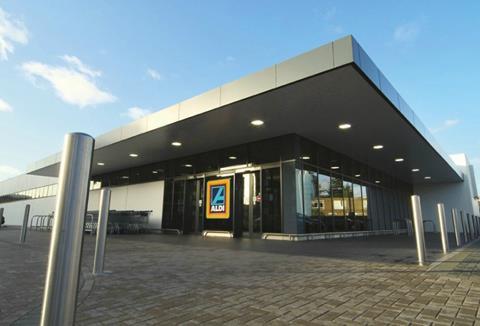The Aldi South Group has committed to reduce absolute Scope 1 & 2 greenhouse gas (GHG) emissions by 52 per cent by 2030

Aldi has established new science-based targets to reach net-zero GHG emissions across its business by 2050, validated by the Science Based Targets initiative (SBTi).
The UK’s fourth-largest supermarket, in line with the Aldi South Group, has also set itself new near-term targets for absolute GHG and Forest, Land and Agriculture (FLAG) GHG emissions up to 2030. This is building on the success of surpassing the Aldi South Group’s previous near-term SBTi-validated targets in 2022.
The commitment makes the Aldi South Group one of the first international grocery retailers worldwide to have science-based targets to reach net-zero GHG emissions by 2050 validated by the SBTi, the retailer said.
In addition to its new long-term targets, its near-term targets mean the supermarket is aiming to reduce absolute Scope 1 and 2 emissions by 52 per cent by 2030 and Scope 3 GHG emissions by 25 per cent by 2030.
The group has also committed to reduce Scopes 1 and 3 FLAG GHG emissions more than 30 per cent by 2030, and to achieving no deforestation across its primary deforestation-linked commodities by the end of 2025. Its new long-term targets include reducing absolute Scope 1 FLAG GHG emissions by 72 per cent by 2050 and cutting absolute Scope 3 FLAG emissions by 72 per cent by 2050.
To meet these goals, the Aldi South Group said it will focus on bolstering its energy efficiency and emission reduction programmes, targeting major sources such as electricity, refrigeration, heating and logistics for operational emissions.
Most notably, the group will implement a series of measures designed to lower supply chain emissions of its sold merchandise products, which account for the vast majority of the group’s overall GHG emission.
In the UK, Aldi has introduced chiller doors to reduce each store’s energy consumption by up to 20 per cent, equivalent to a carbon emissions saving of up to 20 tonnes per store each year, as part of ongoing efforts to minimise its carbon emissions and climate impact.
g“We are putting sustainability at the heart of everything we do. It matters to us, and we know it matters to our customers.
“We know that our scale, internationally, means we can deliver significant change. We have made strong progress in addressing our operational greenhouse gas emissions over recent years, but we want to build on these foundations, working right along the supply chain to make a real difference.”



